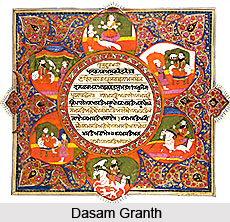 The Dasam Granth also known as the Dasven Padshah Ka Granth is a religious scripture of Sikhism. The Dasam Granth was composed by the tenth guru of the Sikhs, Guru Gobind Singh but it is said that the Dasam Granth was compiled by Bhai Mani Singh after the death of the tenth guru. This particular scripture of the Sikhs has penned down the guidelines of the Khalsa Panth and also consists of the daily prayers of the Sikhs. The Dasam Granth also contains details about the baptism ceremony of the Sikhs. The Dasam Granth consists of 1428 pages. The Dasam Granth can be categorized into three broad categories namely mythological, philosophical and autobiographical. The main languages which have been used in the Granth are Braj, Punjabi, Persian and Hindi.
The Dasam Granth also known as the Dasven Padshah Ka Granth is a religious scripture of Sikhism. The Dasam Granth was composed by the tenth guru of the Sikhs, Guru Gobind Singh but it is said that the Dasam Granth was compiled by Bhai Mani Singh after the death of the tenth guru. This particular scripture of the Sikhs has penned down the guidelines of the Khalsa Panth and also consists of the daily prayers of the Sikhs. The Dasam Granth also contains details about the baptism ceremony of the Sikhs. The Dasam Granth consists of 1428 pages. The Dasam Granth can be categorized into three broad categories namely mythological, philosophical and autobiographical. The main languages which have been used in the Granth are Braj, Punjabi, Persian and Hindi.
The style of the Dasam Granth is mainly a rhymed one because it was composed with a purpose to hear. History says that Guru Gobind Singh believed that the Sikh mind became weak on reading the Adi Granth. They could not even gather the courage to defend themselves. As a result the guru decided to form a scripture which would inspire the Sikhs to defend themselves. The guru`s purpose behind the Dasam Granth was to instill within the minds of the Sikhs the courage to fight against all kinds of injustice.
The largest portion of the Granth is devoted to mythology and gives an account of Hindu mythological stories retold from a Gurmat perspective. The purpose of Guru Gobind Singh behind mentioning the fight of Durga with the demons was to instill a spirit of war within the minds of the Sikhs so that they are encouraged to defend themselves against any kind of injustice. The Jaapji Sahib, the Akal Ustat and the Bachittar Natak are wonderful pieces of composition in the Dasam Granth and serves as the core of religious practice among the Sikhs.
The autobiographical part of the Dasam Granth consists of a detailed account of the life of Guru Gobind Singh. From the Dasam Granth we learn about his parentage, the various battles of courage that he had fought, his divine mission and also how he had received divine enlightenment.
The philosophical part of the Granth comprises adoration of the Almighty and explains the magnanimity of the Lord as the Creator of all things. It also explains how the Lord is the all powerful. Presently the Dasam Granth has been kept open in the Takht Patna Sahib, the Hazur Sahib Nander and the Takht Sach Khand. In all these places of Sikh worship the meanings of the contents of Dasam Granth are explained and importantly the Hukamnama has been taken from the Dasam Granth which serves as the command of the Sikh community.




















